
The rental of affordable housing on the Frankfurt Bridges is carried out in a similar way to the allocation of housing under the German Housing Promotion Act – but with bridge-specific deviations
Tenants can only access affordable housing on the bridges if they can provide proof of income. However, housing is not only available for extremely low-income groups; around a third of the apartments are also intended for people with middle incomes who simply cannot afford an apartment near the city center. Income is used as the basis for calculating the initial rental and must be re-proven every two years in order to be adjusted if income increases. The rent is only adjusted one year after the need for an increase has been established, so that tenants have time to save money for a possible move in that year. Unlike apartments with a housing permit and potential under-occupancy tax, bridge apartments or houses are rented out contractually with rent prices at market conditions, on which a large discount is given. If the income of a bridge resident increases significantly, the rent can be demanded either gradually or (in special cases) even all at once without a discount with a set lead time of one year, for example.
The Frankfurt Bridges create living space on public land: namely above Frankfurt’s wide access roads – in other words, in “unused airspace” in the middle of the city
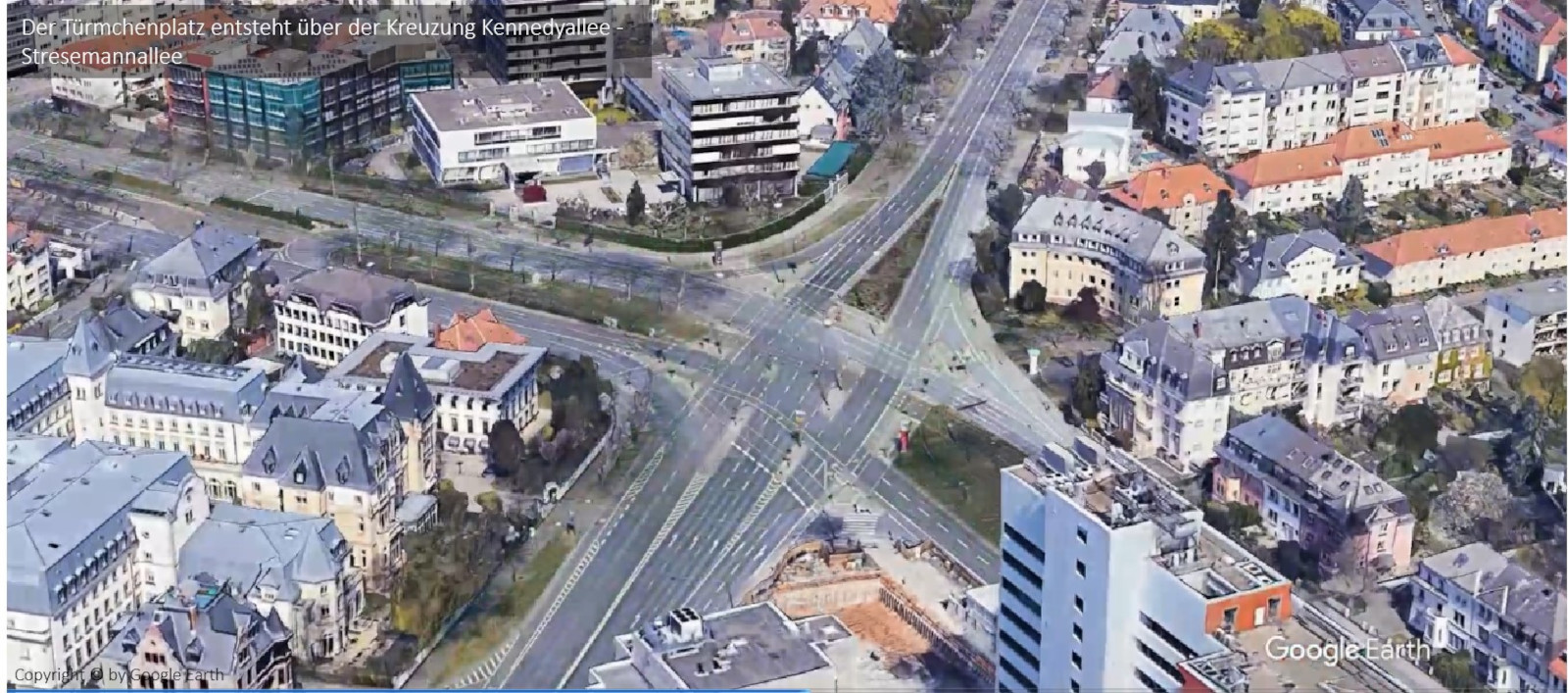
The Frankfurt Bridges carry a new green quarter with over 875,000 square meters of living space for over 30,000 people over these gray, car-driven, sealed areas. This living space is to be rented out by the operating company gGmbH for the duration of the operation (i.e. for around 85 years) to groups of people who, based on their income, need affordable housing close to the city center.
Accordingly, each building on the bridges is assigned a rental price appropriate to the tenant clientele each time it is rented out
The 1.15 million square meters of building space that will be built on the bridges would have a market value of around 25,000 euros per square meter on the free real estate market as of 2022 - not least due to the architecturally aesthetic design and the numerous gardens, balconies and terraces - in the middle of the city or with excellent connections. The bridge properties, like penthouses in sought-after locations, represent the cream of the Frankfurt real estate landscape. This would result in a total speculative value of the real estate bridges of about 29 billion euros. However, in order not to undermine the humane, social and environmentally oriented basic concept of the bridges, a building permit for the Frankfurt Bridges should therefore only be issued under "determination of the rental price structure or the calculation parameters for affordable housing" for 100 years from the start of planning.
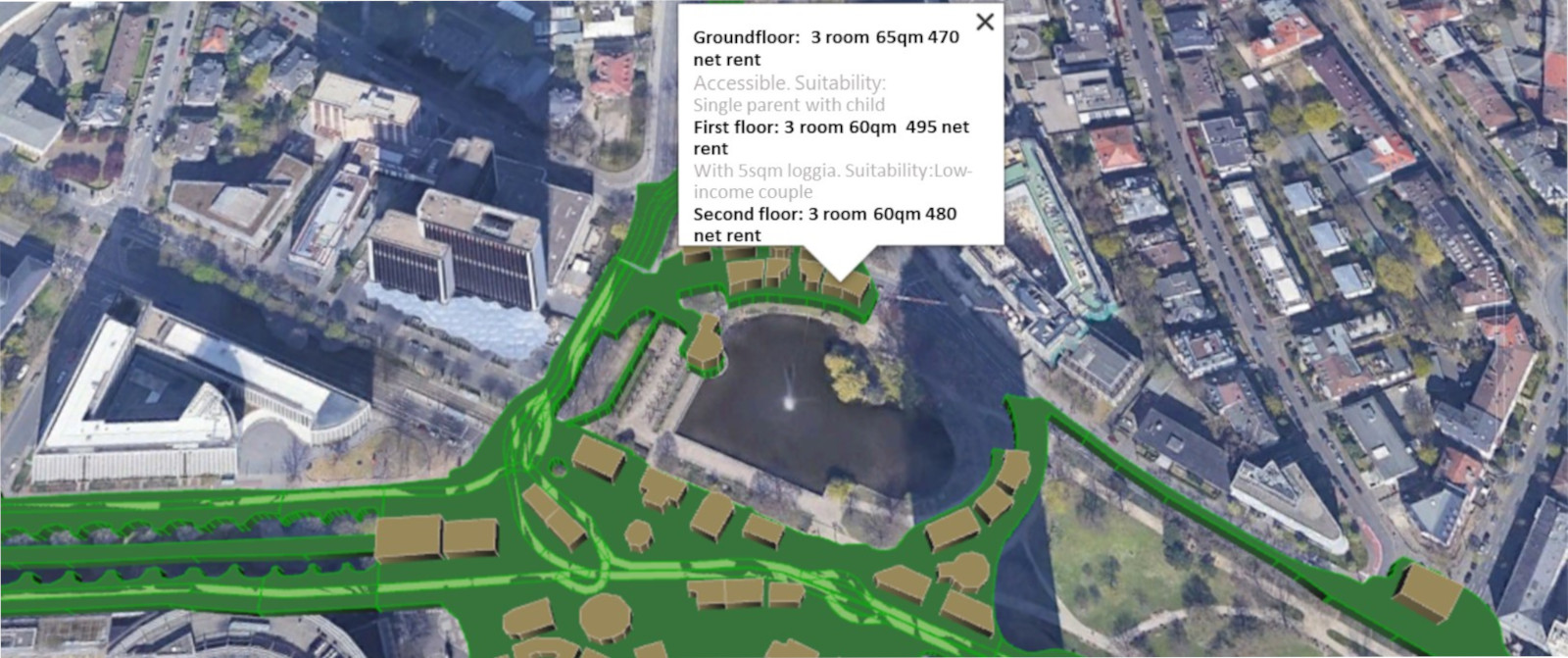
Low-income earners thus represent the basic set of potential bridge tenants: Examples of rental structures for low-income earners (proposed as of 2022)
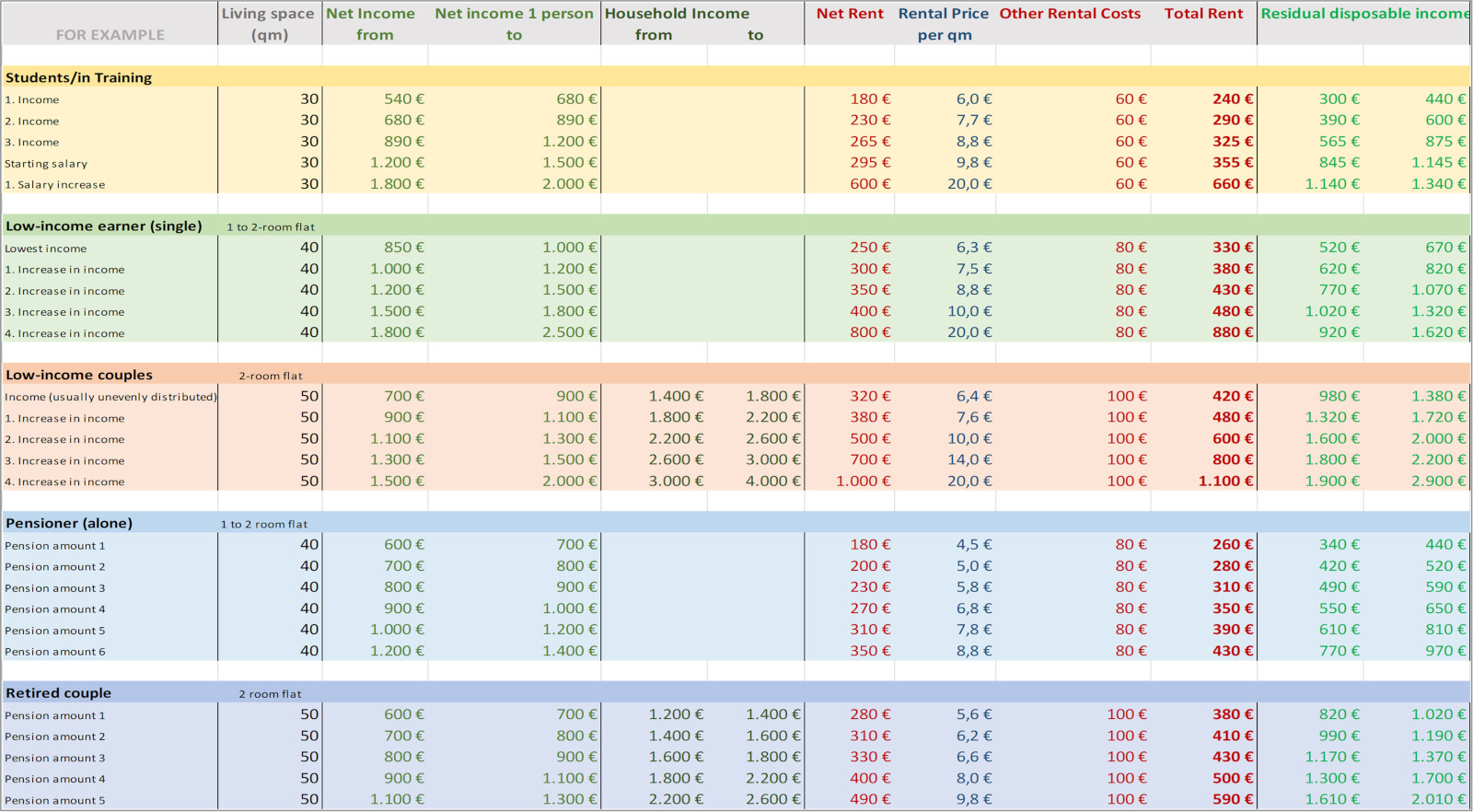
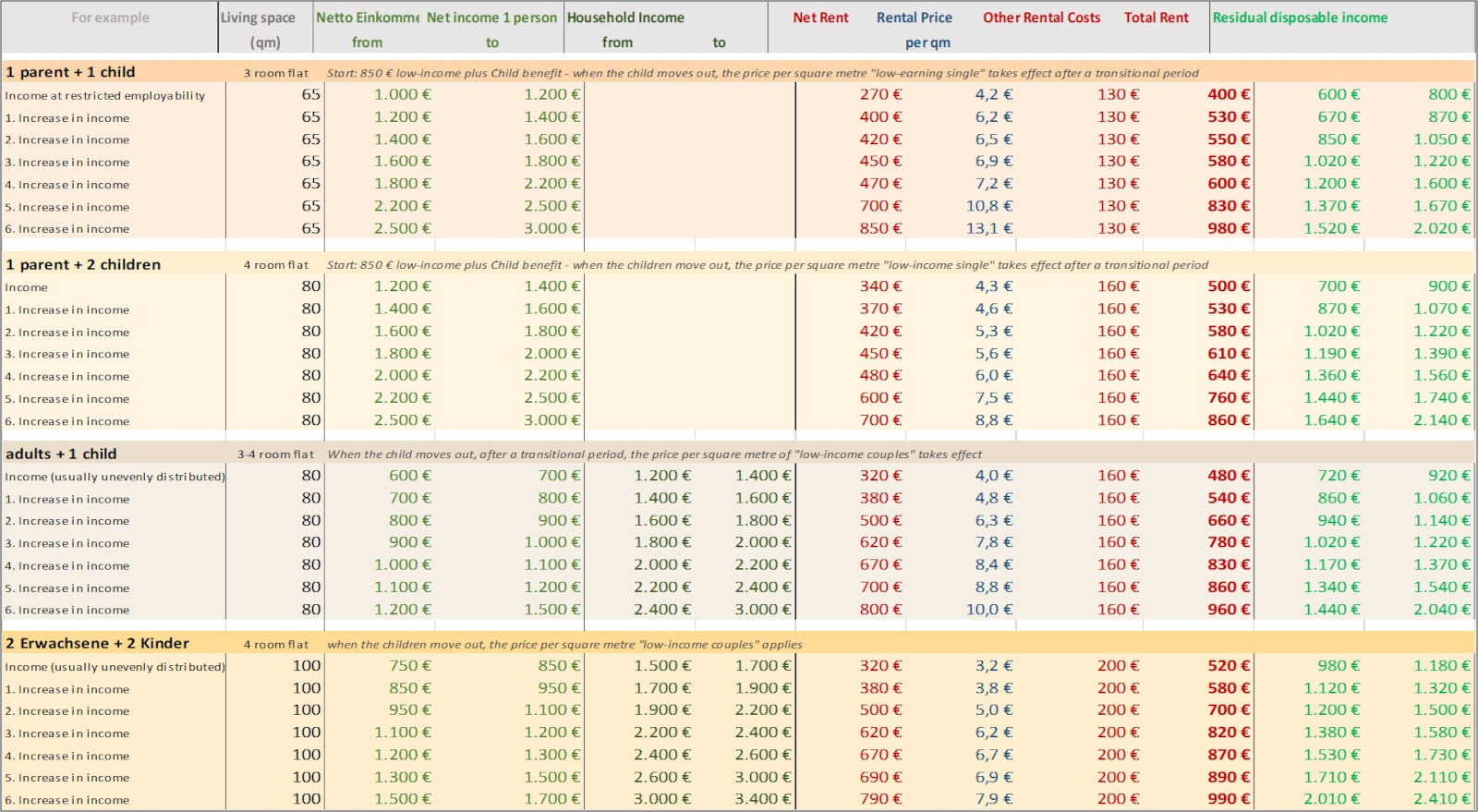
A bridge rent index is already drawn up in the concept planning phase, which also includes a catalogue of criteria for eligible prospective tenants - however, this does not mean that bridge apartments are social housing
Even though welfare recipients are of course not excluded from the allocation of apartments on the Frankfurt Bridges, they are nevertheless not the target group for renting the bridge properties. Rather, it is working people or people who care for relatives (be it parents or children in need of care) who would otherwise not be able to afford housing in an inner city like Frankfurt on their income. At least a third of the space therefore goes to people with middle incomes.
The allocation process for the bridge apartments, on the other hand, is based on the allocation of housing eligibility certificates by the city of Frankfurt and takes over the most important aspects from the German Housing Promotion Act (WoFG):
- Obligation to provide proof of income, assets and household size when renting a bridge apartment
- Renewal of certificates every two years
- If necessary, increase in rent in line with increased income or assets.
The most important deviations from the housing eligibility certificate allocation by the city of Frankfurt are:
- The income limits tend to be set more generously, since, for example, people who earn more than 15,000 euros gross per year (income limit in Frankfurt am Main for a one-person household entitled to a 45 square meter housing permit 2022) cannot normally afford an apartment in Frankfurt's city center. In addition, numerous jobs are offered on the bridges as a way to earn extra money (e.g. in the operator's kiosk or as a transport-assistantfor autonomous vehicles on the bridge's passenger transport). So if a pensioner with 15,000 euros gross per year earns an additional 8,000 euros per year, he should not fall out of the grid of subsidized bridge apartments and should not have to pay any additional contributions just becaue of his raised income. The same applies to parents who work in poorly paid jobs or people in training. All these groups will remain entitled to living space on the bridges.
- Instead of the German “over-occupancy fee”, the rental is contractually agreed with a rent price at market conditions, on which a discount is given. If the income of a bridge resident increases significantly (for example, a student on student loan who suddenly gets a high-paying job after completing his studies), the rent price can be demanded either gradually or all at once without a discount with a set lead time of, for example, one year.
The principle of proximity to the workplace is another important rental criterion
Even though the increased home office culture has made many commutes unnecessary, there are still on-site jobs where employees have to commute to the city every day from affordable, more distant residential areas: schools, hospitals, certain offices, care facilities, etc. need their employees to be on site. Therefore, preference is given to renting to lower-earning employees as well as to those who have to work night shifts in certain industries.
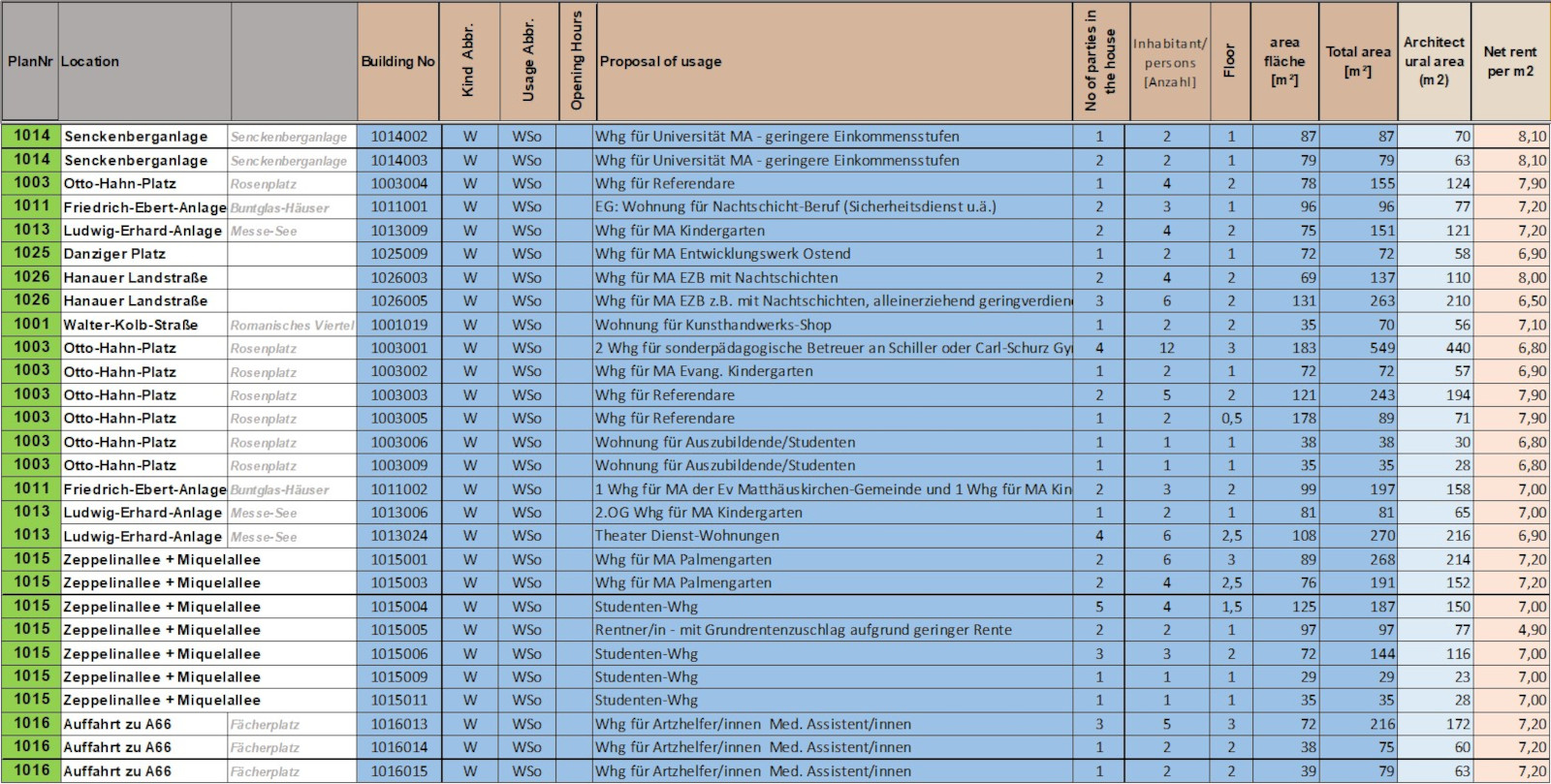
Rental price structure for business owners: Commercial space on the Frankfurt Bridges can only be rented with a positive social contribution
Service providers and restaurateurs have hit the jackpot with space on the Frankfurt Bridges: They get premises that are optimally connected to all areas of the city by bridge traffic, the buildings are all beautiful, most ground floors have terraces or garden areas and the rental prices are still comparatively moderate.
However, the resulting profitability does not go entirely to the respective business owner; rather, the owner must meet certain requirements in accordance with the bridge lease agreement: The most important requirement is the use of the bridge packaging system, which consists exclusively of reusable packaging and those packagings that can be burned without residues or emissions, as well as 100% biodegradable packaging made from renewable raw materials. This applies to the catering trade and its take-away business, as well as to all product packaging, shopping bags, parcel boxes, etc.
In food shops and restaurants, as well as in other shops with everyday items, the products must either be organically certified or come from the region, or be used to create original dishes and baked goods whose ingredients cannot always be obtained from organic sources or sources nearby (for example, in the case of special dishes or baked goods from other far away countries).
The following applies to all companies on the bridges: Employees are allowed to undertake further training for up to one and a half days per week, with full pay. The training usually takes place "on the job" in other companies on the bridges, which then also cover the corresponding portion of the personnel costs.
If a service provider or restaurateur no longer meets these requirements, which are contractually stipulated in the rental agreement, he or she must expect his or her otherwise regular business rental agreement to be terminated without notice.
For tenants along the Frankfurt Bridges, a rent protection statute must come into force after the official and final approval of the B-Plans (i.e. development plans) for the bridge district
As soon as nothing stands in the way of the realization of the Frankfurt Bridges, there is a danger that a rapid increase in rents will take place along the bridges: on the one hand, because locations that were previously considered desolate and inferior being next to wide, gray, busy streets are now expected to be next to the the diverse green bridge district in the future and become thus first-class locations; on the other hand, because for all tenants, even those who are only slightly shaded, once completion of the bridges starts, the rent will be paid by the bridge operating company for up to four years. In order to protect tenants from the thus triggered raise of rents, a rent protection statute must be drawn up in advance with the Frankfurt tenant protection association for all buildings along the Frankfurt Bridges.

